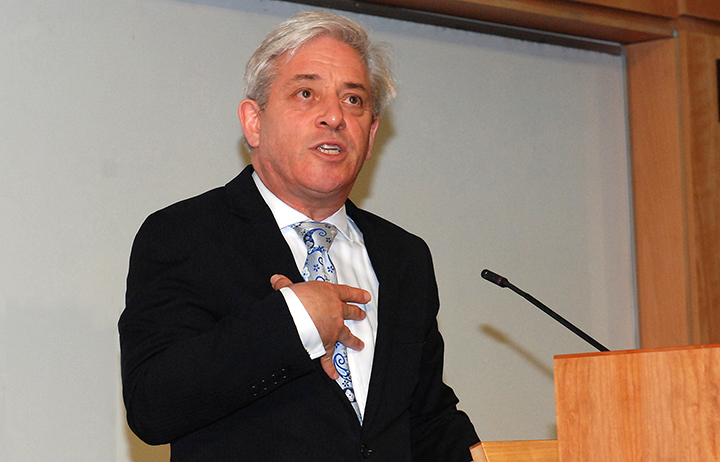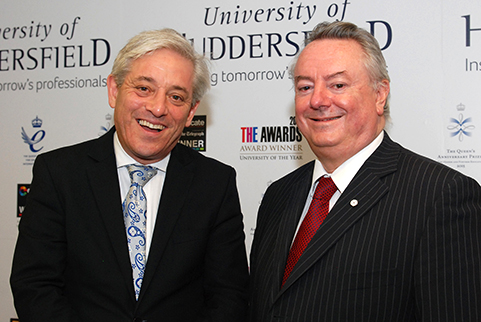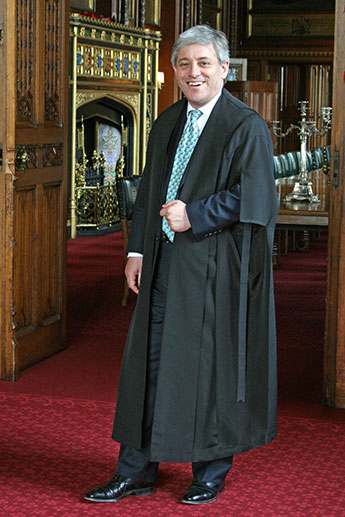Order prevailed when Speaker Bercow presided

Mon, 27 Jun 2016 13:40:00 BST
House of Commons Speaker John Bercow’s public lecture was entitled The Making of a Modern Parliament
 ◄ Speaker John Bercow with the University’s Vice-Chancellor, Professor Bob Cryan
◄ Speaker John Bercow with the University’s Vice-Chancellor, Professor Bob Cryan
WHEN House of Commons Speaker John Bercow came to deliver a special lecture at the University of Huddersfield, it was in the immediate aftermath of the Brexit vote. He told a packed audience that the referendum had only happened because of moves to modernise Parliament and make Government more accountable to MPs.
After Mr Bercow was first elected Speaker in 2009, he decided that ordinary Members should be allowed to choose the business of the House at least once a week. The result was the establishment of a Backbench Business Committee. It has played a key role in many examples of pioneering legislation, said Mr Bercow, who then looked back to 2011, when the Conservative Party was officially opposed to the principle of a referendum on EU membership.
“But there was a very large minority among backbenchers who thought that policy should be in favour of a referendum,” he went on. “The Backbench Business Committee secured a debate and there was a huge revolt against the Government’s position. It led to the Conservatives changing their position in favour of a referendum.
“Whether you think that the outcome was a good thing or a bad thing, it was a change brokered from the grass roots and that, surely, in a democratic system is the right way to go about things,” said Mr Bercow.
He is Conservative MP for Buckingham, but as Speaker he is required to be divorced from party politics.
“That is why I don’t take a stance on matters of public dispute, but I am prepared to admit that while I absolutely respect the referendum result, I was surprised by it. I thought it would be close but that the Remain campaign would win.”
Mr Bercow added that in the aftermath, Prime Minister David Cameron resigned “with great dignity and statesmanship”.
The lecture was titled The Making of a Modern Parliament and Mr Bercow described the various roles of the Speaker, including its historic one of chairing debates in the House. This meant he had had to know the names of all 649 MPs, resulting in a fresh learning challenge after every election brought a new intake.
The Speaker today has a much more varied role than in the past, said Mr Bercow, who went on to describe his role as a catalyst for “much-needed reform”.
 For example, when he became Speaker his biggest single gripe was that ministerial question times in the Commons had become ponderous. He determined to speed them up, so that more points of view could be heard.
For example, when he became Speaker his biggest single gripe was that ministerial question times in the Commons had become ponderous. He determined to speed them up, so that more points of view could be heard.
“I have set out to make exchanges more vigorous, topical, and interactive and probing. The function of MPs is to scrutinise legislation, policy, administration and expenditure,” said Mr Bercow, who emphasised that Parliament was not synonymous with Government.
The Speaker has also insisted that all Government policy announcements should be made to the House of Commons first, before the media. And Mr Bercow has revived the practice known as Urgent Questions, under which MPs can apply to the Speaker for ministers to be summoned to the Commons to explain their decisions. This had almost fallen into disuse, but over the past seven years of his Speakership, there had been 305 Urgent Questions.
Other innovations presided over by Mr Bercow included an insistence that select committees should elect their own chairs. As a result, the committees were more assertive, demanding, scrutinising and challenging to the Government, he said.
“The very fact that we have enfranchised select committee chairs has emboldened them and they are not pushed around by ministers or whips. The House should start to discover some self-respect, get off its knees and stand up to the Government of the day.”
Mr Bercow has attracted controversy but he was re-elected as Speaker in 2015. During his lecture he also described innovations such as installing a nursery in the Commons and his insistence that all employees of the House should be paid the London Living Wage. He has also developed an outreach role, which sees him addressing audiences around the country.
Traditionalists had initially been hostile to this. “But the Speaker should get out beyond Parliament and speak up for what Parliament does.”
Mr Bercow opened his lecture by describing family connections with Huddersfield and praising the local textile industry and the town’s University, especially its status as a debt-free institution.
He was introduced by the University’s Vice-Chancellor, Professor Bob Cryan, and thanked by the Mayor of Kirklees, Councillor Jim Dodds.







